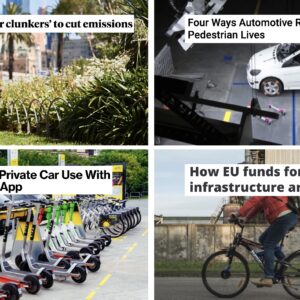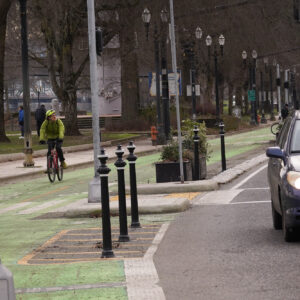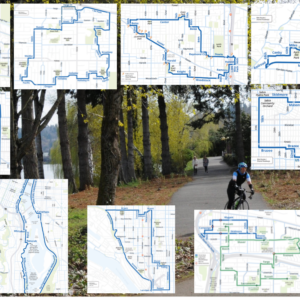The Obama Administration’s Cash for Clunkers program has caused a lot of confusion and a bit of outrage among bicycle and sustainable transportation advocates. For politicians devoted to the environment and sensible transportation choices, it has meant tough decisions.
Started as a way to kickstart the economy and improve the fuel efficiency of the nation’s auto fleet, the program has driven thousands of people to deserted auto dealers. The program has been so popular that it has run out of cash. The U.S. House of Representatives voted to add an additional $2 billion of emergency funding to the program and the Senate is expected to vote on it this week.
“I was uncomfortable that we didn’t tighten the definition enough to make sure… that we were really getting rid of foul clunkers, and we’re replacing them — not with a new Suburban — but with more fuel-efficient vehicles.”
— Congressman Earl Blumenauer on why he voted against a $2 billion bailout of the program
But at what cost (to our transportation goals, public health, economy, etc…) has the program “succeeded”? To many, Cash for Clunkers seems like nothing more than a subsidy for the auto industry and it seems to fly in the face of commitments from the Obama administration to encourage less driving in order to create more livable communities.
With all this swirling around my head, I asked Congressman Earl Blumenauer about the program at a fund raising event I saw him at last night. I asked him to help me understand how lawmakers can justify a commitment to green transportation and livable communities while handing out checks for people to buy new cars. Here’s how he responded:
“I think the principle has great merit. We have stuff on the road that shouldn’t be there; it’s polluting, it’s dangerous. I mean, you look at the profile of some of these things that are driving around now — they’re more likely to be involved in accidents, they’re more likely to be abandoned and we have to somehow get them out of the neighborhoods.
Cash for clunkers is something I think should be part of an overall strategy.
I was uncomfortable that we didn’t tighten the definition enough to make sure that we have the delta [the gap between what’s considered a clunker and what someone can purchase], that we were really getting rid of foul clunkers, and we’re replacing them — not with a new Suburban — but with more fuel-efficient vehicles.
I actually voted against it [the $2 billion bailout] — and I’m sure it gave some of my auto dealer friends heartburn — because I didn’t feel comfortable with tripling the size of the project that was supposed to last until the end of the year that may not last two weeks, and to make sure it isn’t just throwing money at an expensive rebate.
Yes it helps the economy, yes it helps the upper Midwest, but I’d like us to be more careful.
I think the message has been delivered. The administration was in a tough spot because it got launched and it may run out of money, leaving the dealers in a lurch and they didn’t want to do that…
Some of us are sympathetic to the goal, but we would like to see it institutionalized as part of a strategy that actually does get rid of clunkers and replaces them with cars from the future and we scale it back to where it should be so the program can be sustainable.”
Unless the specifics of this program fundamentally change (and the Senate isn’t voting on new amendments, only on the already-passed House extension), it seems the debate will rage forever. The optimist in me sees this as an example of the saying, “Don’t let the perfect be the enemy of the good,” but the pessimist in me sees this as nothing more than another example of automobile culture and messy politics run amok.
As for Blumenauer, he seems to have bigger fish to fry in his quest to build relationships on both sides of the aisle in order to make sure bicycles are a larger part of the transportation status quo.








Thanks for reading.
BikePortland has served this community with independent community journalism since 2005. We rely on subscriptions from readers like you to survive. Your financial support is vital in keeping this valuable resource alive and well.
Please subscribe today to strengthen and expand our work.
There is no way in hell that Cash for Clunker’s was a good concept, no matter how it would have been executed.
The proper thing to do would be to decrease the number of new vehicles made, and encourage people to better maintain and to continue driving the clunkers, unless of course they are too far past that.
Instead they encourage people to abandon the car they have, and finance a car that many cannot afford.
Perhaps the real Cash for Clunkers program would be to replace the backward thinking people we allow to make such decisions.
And, I must say it, we should start at the top, and work our way down….
The problem I have with the C4C program is people really don’t need to trade the old gas guzzler for anything more efficient. You can basically trade that old Ford F-150 for another one that gets one mpg better. (Not making that up. Look at the site for yourself.)
I have a car that should be considered a clunker, but gets 25 combined mpg. It’s almost like a slap in the face to someone that took care of an older, fuel efficient car that they can’t qualify. But, I realize live isn’t fair.
Part of me wonders, too, with all the new metal that needs to be mined and transported, how much is this going to help the environment if people buy cars that get similar mpg ratings?
You also have to look at the carbon footprint of the new vehicle. Driving an old car, even one with poor gas mileage is often better than buying a new one because you’re saving a LOT of carbon and pollutants in the manufacturing process of the new car. Of course, Cash for Clunkers was really a pure economic stimulant than anything else. People just liked to label it as environmental friendly because then other people will be conned into thinking that they really care about the environment.
While I agree that the CARS (aka Cash for Clunkers) bill has some serious faults, I don’t really see that it is a complete failure of transportation policy. First of all, the bill does target the market segment of vehicles that have the worst attributes of styling, efficiency, and design of the past 25 years. I am happy to see these engines get destroyed and their bodies recycled. The top vehicles turned in under this program have been SUVs, (mostly Ford Explorers) and the most popular vehicles purchased have been small cars. There are ancillary benefits to getting these big vehicles off the road and replacing them with small vehicles other than just collective fuel savings, such as:
-Increased safety for those in smaller vehicles (or on bike) due to better braking and handling
-Better visibility around vehicles in traffic for cyclists
-Narrower vehicles (generally) to hopefully minimize risk of getting doored
-Lower impact on roads/bridges due to lighter vehicles
-Quieter road environment due to narrower tires and (generally) smaller engines
People who are taking advantage of this program are people who are going to drive anyway, they are not about to mode shift for $4,500. The CARS bill just makes it a little more pleasant for them to own a newer vehicle. Of course those billions could be better spent on non-motorized transport, but I am still glad to see people getting into smaller, more efficient vehicles. If only we could get them (on)to the most efficient vehicle in the world…the bicycle.
From a Slate article I read earlier today (http://www.slate.com/id/2224306/)
“According to an early analysis from the Web site Cash for Clunkers Information—which estimated an average fuel-economy increase of 69 percent and total sales of 250,000 cars—the program would cut overall fuel consumption by about 76 million gallons a year and carbon dioxide emissions by about 737,200 tons annually. Using Chameides’ figures, it would produce about 1.7 million tons of CO2 to manufacture those 250,000 cars, so we won’t really see those savings until a little more than two years from now.”
That means that (theoretically) after two years we start realizing CO2 savings from the clunker program, which means that the program does have a positive affect on CO2, even with the building of new cars.
Thus far the average trade in has resulted in a 61% increase in fuel economy, not 69%, so it’ll take us a bit longer to actually break even after manufacturing. Nevertheless, a 61% gain in fuel economy is a *good* thing. I don’t really see the downside of this program.
Thanks Mr./Ms. JV and Cyclist for that data. I’d love more links to the data.
It’s good to try experiments like this and make improvements to the next C4C legislation. Why not things like Clunkers for cargo bikes, electric bikes, 10 year transit passes? The next attempt at C4C needs to only accept real clunkers, and only reward people with cars doing 35MPG and UP.
Really, the sky is the limit when it comes to the post Bush era of closed minded policy.
DC Translator: “building relationships on both sides” means never having the courage to do big things.. AKA stop an illegal war that will de-fund our schools, bikes, health, and everything else.
Earl, it’s not just the little good deeds you do, it is the big duties you avoid in the name of strategy.
Perhaps the next stimulus program could simply be titled
“A sucker is born every minute”.
Oh wait, that is already the subtitle for our election process….
“I was uncomfortable that we didn’t tighten the definition enough to make sure that we have the delta [the gap between what’s considered a clunker and what someone can purchase], that we were really getting rid of foul clunkers, and we’re replacing them…”Blumenauer
I think that’s one one of the more significant thoughts in regards to effective application of this program. From reading news stories, seeing pictures of the cars traded in, there’s reason to doubt the wisdom of encouraging people to trade in their old rigs, after which they’ll be scrapped…even if they’ve got good, reusable parts, or are economically repairable by any number of avid backyard mechanics. Of course, all the Cash for Clunkers rigs actually run…that’s required to meet the terms of the program.
This program encourages the throwaway habits of American consumers. Basically, what it gets down to, is if someone has a running vehicle…possibly even a good running vehicle whose market value is less than $4500, and they want to buy a new car, it’s easier to unload the car with this program than it is to trade it in or sell it.
Incidentally, last week over on blueoregon, someone started a thread with the idea ‘Clunkers for Bikes’…asking readers to consider whether bikes or car sharing shouldn’t have been included as an option in this program.
There’s no way the $2 billion renewal is going to pass the senate anyway.
People keep saying they expect a vote this week, but I’m confident they’ll spend the whole time debating health care (since that’s kind of more important) and they’ll go into their August break before voting on it, which would essentially kill the program since it will run out of money before their session starts up again.
As anecdotal evidence, two people I work with traded in late 1980’s pickups that got 10 mpg for small economy cars so from what I see the program was successful. If the statistics are showing a 61% increase in fuel efficiency that is pretty good. There is less pollution, better safety, jobs are created, what is wrong with it. It is basically a tax cut for the middle class and after 8 years of tax breaks for the wealthiest it is refreshing and this one really does stimulate the economy. Blumenauer is wrong on this one.
I would truely be impressed if they had a transit subsidy or money for a bike and commuter equipment as an option. Of course, Blumenauer is the only Rep who has a strong bike economy constituency. Everyone else has a business as usual constituency.
I’ve been mildly annoyed by the c4c idea, until now, when I gave it more of a thought…
-Hey Obama,
-How about giving me 4500 for not
-putting a car on the road period?
-I can document my bike commute for the
-last 3 1/2 years.
-I’d be happy to provide the
-documentation as needed.
-Thanks!
It’s apparent from the overwhelming response to the program that the incentive was too big. When the second infusion of cash was made, they should have reduced it by at least half, allowing the program to run longer and have a greater impact for the same expense to taxpayers.
Sorry, my last post was a bit ambiguous – I’m talking about halving the $4500 credit being given out.
oops… make that:
-How about giving me $4500 for not
-putting a car on the road period?
I like that idea, K’Tesh.
I recently drive XC from Jersey to come to school here in Portland. Now that Im here in the city, it didn’t take me long to realize I don’t need my truck anymore. Can I trade it in for a few grand? (sure isnt worth that much to sell!)
Join the Bikes for Clunkers Movement! Let’s get the Senate to allow the cash to be spent on bikes and transit. http://www.facebook.com/group.php?gid=108468061641
We could have had McCain/Palin as president right now. Enough said. Geez, after the last 8 years I will cut Obama a lot of slack. He was left a mess and not everything will be perfect but Blumenauer and a lot of these guys seem to forget that. People here complaining about a billion dollars spent for this program which actually benefits us seem to forget we spend and are still spending a billion a week in Iraq.
NPR did the carbon footprint impact of the new cars. On average it will take 5 years before the new vehicles increased mileage will offset the carbon foot print of a new car. That includes the entire supply chain required to build the vehicle.
C4C IS an absolute failure in transportation policy:
1. We’re not allowing used auto parts dealers to recycle the still-usable parts from the clunkers; every clunker must be completely disabled in a process that renders the car completely unusable and harder to recycle.
2. We’re bribing people to buy new cars, another attempt to prop up an auto industry that really needs to be allowed to die (or at least shrink a great deal).
3. We’re luring people into another round of debt; $4500 doesn’t go very far when the average price of a new car is over $25,000.
4. That money, instead of being used to prop up the dying auto industry, could/SHOULD be used to revitalize public transit and passenger rail travel across the country.
But our elected officials are once again bound to the ball and chain of Big Auto and Big Oil, and that’s why we’ll see more of these stupid, short-sighted policies in the future.
Earl Blumeanuer: the same guy who voted for a Wilderness Proposal that CLOSED 110+ miles of trials to mountainbikers, trails he is quoted as saying “are some of the best singetrack in the universe”. And he claims to be pro-bike. Just another lying politician, like our Mayor!
Dang I’m glad I have the Right to express my opinion.
Maybe old&slow is right…it’s only…a billion…dollars being spent on this program. What’s a billion dollars anymore in the overall scheme of things where the business of big nations is at play(actually…it may soon b 3 billion, since congress just authorized 2 mil more pending senate approval)?
The U.S. gov seems to love throwing away citizen taxpayer money in its continuing efforts to sustain world economic superiority, instead of working to help make a decent standard of living accessible to all of those citizens regardless of which economic level they’re in. Wage a war? No problem. Bail out the auto and the loan industry? No problem…these are things that as a nation…we must do! Make sure every citizen can have basic health care? Sorry…that would break this country financially!
Walking around my neighborhood, I can see who it is that’s really driving clunkers…poor people. They pick up a $300 piece of junk that smokes, maybe lasts six months to a year, but runs well enough to get them out to the job site where no bus service exists to take them…so they can keep a meager existence together. What good is this program doing them? Shouldn’t they be the ones whose cars should be replaced through this program? Congress apparently didn’t think to set it up so it might have done that.
Rewarding the irresponsible and punishing the responsible. It’s the American Way.
wsbob, Obama is trying to get a healthcare bill passed now which is getting shot down as we speak. Yes, a billion is a lot, did you write and complain to anybody about the 2 trillion in tax cuts to the top 1% that Bush gave away in 6 years? Again, this is a middle class tax, it is easy to complain about the auto industry and we do need to transiton out of it but right now we have 10% unemployment in the country and it is threatening to derail healthcare and every other progressive policy. We need some positive economic news or these “tea party” idiots are going to stop everything this administration is trying to accomplish, which as far as transportation policy goes is lightyears ahead of what we had or could be having now.
76 million gallons of gas is a lot. I won’t dispute that. However, according to the Dept of Energy’s website, the US used 137.8 billion gallons of gas in 2008. So basically if my calculations are correct, that 76 million gallons is equal to what the US uses in a little less than five hours.
I am willing to give Obama some slack. But agreeing with everything he pushes is pretty counter-productive, too.
I took advantage of this program. To fix all the problems in my “clunker” would have cost me roughly $6000. To fix the problems that caused it to be less then reliable, $4500. It’s blue book value was $600.
Between the cost of repairs and the clunker value, I was able to put a fairly large down payment on a very nice and much more fuel efficient vehicle. With 0% financing and I’ll have this care paid off in two years. Add in the fact that the old care needed premium and I’ll estimate I’ll be saving 40% on gasoline costs alone to go the same distance.
I believe I’m ahead of the game and will be able to trade this car in five years or so for one of the ultra efficient hybrids. Or maybe high speed rail between Seattle and Southern Oregon will be in place and I’ll finally be able to get rid of a car totally.
I disagree with the merits discussed with this program – that’s rationalization. What was the goal of the program? Spending, pure and simple, not conservation. If the goal was to decrease fuel consumption another approach might be to have the balls to raise the federal gas tax, which would help reduce the highway fund deficit, and get people to drive less and/or combine trips and/or carpool and/or raise fuel efficiency as a priority in deciding which car to purchase/lease next. The politicians are NOT trying to get old clunkers off the street, they’re trying to get consumers to buy/lease new cars to keep dealerships and manufacturers in business. Call a spade a spade.
I don’t think C4C was an entirely bad idea. It should probably just have been thought through more carefully before carrying it out so as to perhaps achieve desired goals more effectively. Experiences such as those related by Rick Hamell #26, make a fair case in favor of the program, but the people putting this program together could probably have done lots better. Numerous suggestions along those lines have been made in the comments above.
The basic requirement that the vehicles traded in must be destroyed seems very wasteful. Actually, I found the wiki article this morning which explains that the “…disabled engine (most specifically the long block components), the transmission/transaxle, and in some cases the axle assemblies.” cannot be sold by the salvage or scrap facility. They have 180 days in which they can sell anything else off the vehicle before having to crush or scrap it (The specs for this program are somewhat complicated.).
Despite that, I still have to question the wisdom of allowing this program to force the destruction of all those possibly reusable vehicle components. Some of those cars might have been candidates for electric conversion. DIY guys here in Portland do that very thing. With electric powertrain technology R&D advances being ramped up, this could happen on a much broader scale.
Obama is doing just fine…way better than his predecessor. I’d be more worried if people stopped complaining about something or other he did than I am now with critics routinely coming up with some new complaint each week.
Palin? Why worry? She’s so cute! Certainly not ready for the big time though. Even Republicans and other conservatives weren’t desperate enough to keep their party in office by voting in sufficient numbers for her and her buddy McCain.
This last paragraph is in response to a couple of widely off-topic and antagonistic comments which I deleted. Thanks for keeping it focused, folks. — Elly
How about a cash for clunker bikes. I’d be happy to get $1k to buy a sweet new bike to commute on and give my clunker bike to someone else that could use it or it’s parts.
How many times will the auto industry be bailed out with our money? This money could have been shared by all of us in a refund
I got a mountain bike I would trade for a cargo bike if I could get a could get a $500 credit.